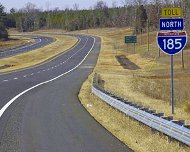We heard explicitly in testimony at yesterday’s Joint Public Hearing of the House and Senate Transportation Committees that with regards to private toll road contracts, TxDOT stated that the private operator was taking all the risk, not the taxpayers. Well, the Bond Buyer reports differently (below). How is this a transfer of risk when Cintra is guaranteed profits if toll traffic dips below a certain minimum?
The article states:
“The developer is guaranteed a set reimbursement, creating an element of risk for TxDOT if use of a tollway falls below projections.”
Also, how is their access to capital better than the public’s when they’re using federally-backed TIFIA loans and PABs that are tax-exempt just like public sector toll projects?
“They (Cintra) will borrow about $500 million from private lenders and seek an equal amount in government-backed loans from the Federal Highway Administration.”
We now know the answer to these questions. See why the public doesn’t trust a word out of the mouths of TxDOT?
Texas Officials Seek a New Path To Private Transportation Funding
Tuesday, February 2, 2010
By Richard Williamson
The Bond Buyer
DALLAS — With a statewide moratorium on new private toll projects still in place after more than two years, the Texas Transportation Commission is planning a bypass around that financial barrier to leverage existing funds.
While the financial constraints exist statewide, the Dallas-Fort Worth Metroplex serves as the incubator in terms of innovative public-private finance, say Texas Department of Transportation officials.
“This is, in my view, the premier national laboratory for transportation projects,” said TxDOT spokesman Chris Lippincott. “There’s a lot of interesting stuff going on.”
The latest scheme — one that will require rule changes and exhaustive risk analysis from department staff — would allow a private developer to design, finance and rebuild a 28-mile section of Interstate 35-East from Dallas northward to Denton in exchange for reimbursement from TxDOT.
The finance method, known as pass-through tolling, is relatively new but well established with local governments, particularly counties. The system has never been used with a private developer, according to TxDOT. Nevertheless, current law allows the use of pass-through tolling by private companies.
Read the rest of the story here.





 The first public-private partnership toll road established as a not-for-profit corporation has gone bust. The Connector 2000 Association, which operates a sixteen-mile, four-lane toll road linking Interstates 85 and 385 in southern Greenville County, South Carolina, announced last week that it was in default on its financial obligations.
The first public-private partnership toll road established as a not-for-profit corporation has gone bust. The Connector 2000 Association, which operates a sixteen-mile, four-lane toll road linking Interstates 85 and 385 in southern Greenville County, South Carolina, announced last week that it was in default on its financial obligations.